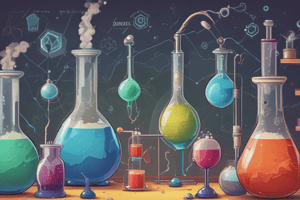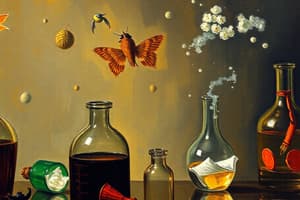Podcast
Questions and Answers
What is a chemical property?
What is a chemical property?
The ability or inability of a substance to combine with or change into one or more new substances.
What is a chemical change?
What is a chemical change?
The change of one or more substances into other substances.
What is dissolving?
What is dissolving?
The process in which substances mix evenly with one another.
What are physical properties?
What are physical properties?
Is 'Silver tarnishes from sulfur in foods' a chemical or physical property?
Is 'Silver tarnishes from sulfur in foods' a chemical or physical property?
Is 'Hydrogen is flammable and burns in the air' a chemical or physical property?
Is 'Hydrogen is flammable and burns in the air' a chemical or physical property?
Is 'Carbon Dioxide is nonflammable' a chemical or physical property?
Is 'Carbon Dioxide is nonflammable' a chemical or physical property?
Is 'Aluminum reacts with acid' a chemical or physical property?
Is 'Aluminum reacts with acid' a chemical or physical property?
Is 'Water boils at 100 degrees C' a chemical or physical property?
Is 'Water boils at 100 degrees C' a chemical or physical property?
Is 'Silver is a good electrical conductor' a chemical or physical property?
Is 'Silver is a good electrical conductor' a chemical or physical property?
Is 'Table salt (NaCl) melts at 801 degrees C' a chemical or physical property?
Is 'Table salt (NaCl) melts at 801 degrees C' a chemical or physical property?
Is 'Diamonds are extremely hard' a chemical or physical property?
Is 'Diamonds are extremely hard' a chemical or physical property?
Is 'Baking soda (NaHCO3) is a white crystalline powder' a chemical or physical property?
Is 'Baking soda (NaHCO3) is a white crystalline powder' a chemical or physical property?
Is 'Mercury is a liquid at room temperature' a chemical or physical property?
Is 'Mercury is a liquid at room temperature' a chemical or physical property?
Is 'Apples turn brown in air' a chemical or physical change?
Is 'Apples turn brown in air' a chemical or physical change?
Is 'Sugar dissolves in water' a chemical or physical change?
Is 'Sugar dissolves in water' a chemical or physical change?
Is 'Abandoned car rusts in air' a chemical or physical change?
Is 'Abandoned car rusts in air' a chemical or physical change?
Is 'Paper burns' a chemical or physical change?
Is 'Paper burns' a chemical or physical change?
Is 'Ice melts into water' a chemical or physical change?
Is 'Ice melts into water' a chemical or physical change?
Is 'Liquid forms as water vapor cools' a chemical or physical change?
Is 'Liquid forms as water vapor cools' a chemical or physical change?
Is 'Easily reversed' a chemical or physical change?
Is 'Easily reversed' a chemical or physical change?
Flashcards
Chemical Property
Chemical Property
A substance's ability to change into a new substance.
Chemical Change
Chemical Change
One or more substances changing into other new substances.
Dissolving
Dissolving
Substances mixing evenly.
Physical Property
Physical Property
Signup and view all the flashcards
Silver tarnishing
Silver tarnishing
Signup and view all the flashcards
Hydrogen flammability
Hydrogen flammability
Signup and view all the flashcards
Carbon Dioxide Nonflammability
Carbon Dioxide Nonflammability
Signup and view all the flashcards
Aluminum and Acid Reaction
Aluminum and Acid Reaction
Signup and view all the flashcards
Water Boiling Point
Water Boiling Point
Signup and view all the flashcards
Silver Electrical Conductivity
Silver Electrical Conductivity
Signup and view all the flashcards
Table Salt Melting Point
Table Salt Melting Point
Signup and view all the flashcards
Diamond Hardness
Diamond Hardness
Signup and view all the flashcards
Baking Soda Properties
Baking Soda Properties
Signup and view all the flashcards
Mercury's State
Mercury's State
Signup and view all the flashcards
Apples Browning
Apples Browning
Signup and view all the flashcards
Sugar Dissolving
Sugar Dissolving
Signup and view all the flashcards
Abandoned Car Rusting
Abandoned Car Rusting
Signup and view all the flashcards
Paper Burning
Paper Burning
Signup and view all the flashcards
Ice Melting
Ice Melting
Signup and view all the flashcards
Water Vapor Cooling
Water Vapor Cooling
Signup and view all the flashcards
Easily Reversible Change
Easily Reversible Change
Signup and view all the flashcards
Study Notes
Chemical Properties
- Define chemical property as the ability or inability of a substance to combine with or change into one or more new substances.
- Silver tarnishing and hydrogen flammability are examples of chemical properties.
- Carbon dioxide's nonflammability and aluminum's reaction with acid are additional chemical properties.
Chemical Changes
- Chemical change refers to the transformation of one or more substances into different substances.
- Apples turning brown in air, rusting of abandoned cars, and burning of paper illustrate chemical changes.
- Sugar dissolving in water and formation of liquid from vapor cooling represent chemical changes as well.
Physical Properties
- Physical properties are characteristics of a material observable without altering its identity.
- Water's boiling point at 100 degrees Celsius and silver's conductivity are examples of physical properties.
- Other physical properties include table salt's melting point at 801 degrees Celsius, diamonds' hardness, and mercury's liquid state at room temperature.
Physical Changes
- A physical change is a reversible change that does not alter the substance's chemical structure.
- Ice melting into water and dissolving sugar in water are classic examples of physical changes.
- Such changes, like becoming easily reversible, are common in physical transformations.
Studying That Suits You
Use AI to generate personalized quizzes and flashcards to suit your learning preferences.




